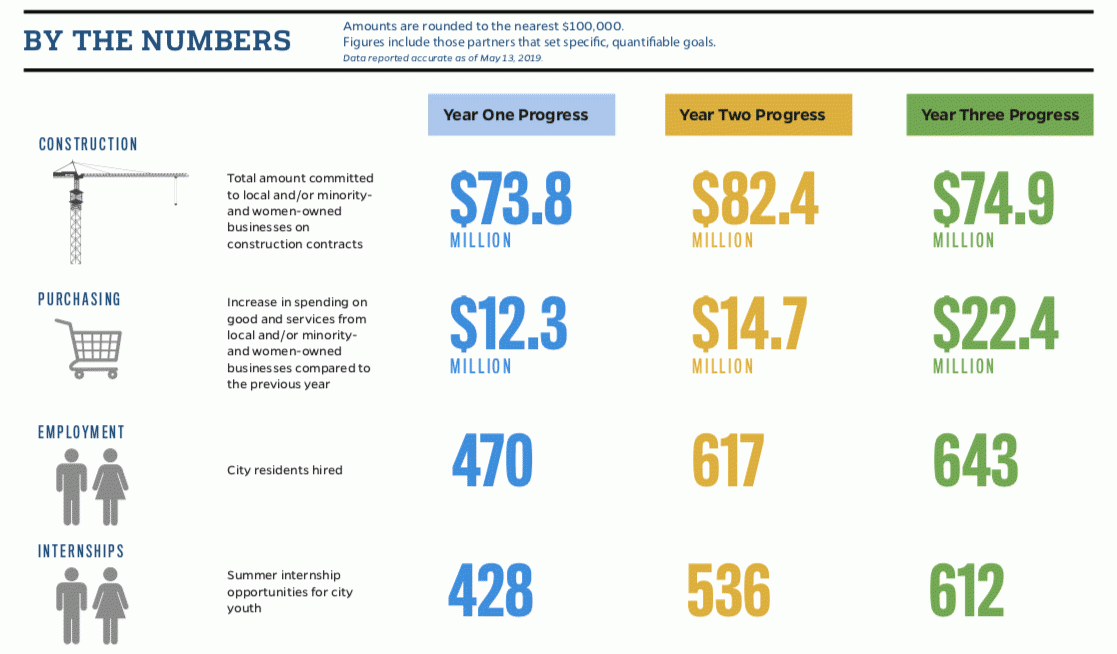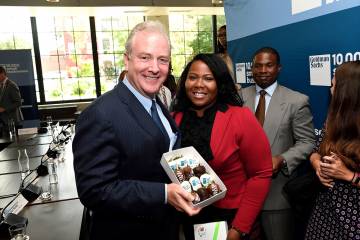Twenty-five local companies that came together pledging to create more economic opportunity in Baltimore report that after the first three years of that effort, they've committed to buying $50 million more from city and minority vendors than they had been and have hired more than 1,700 Baltimore residents.
The BLocal coalition's original three-year goal was to commit or spend $69 million for purchasing or construction with local and minority vendors. But the coalition surpassed that in year one, and continued to spend increasingly more the following two years. In 2018 alone, the BLocal partners spent or committed $97 million for purchasing or construction with local and minority vendors.
The BLocal partners also eclipsed their original hiring goals, hiring 1,729 Baltimore residents over three years and, in addition, hiring 1,576 Baltimore youth for paid internships.
Additionally, the BLocal coalition has expanded to a total of 28 Baltimore companies, large and small firms including banking, construction, real estate, and professional services.
"BLocal unites a network of 28 local employers spread across this city to support its citizens and entrepreneurs in a way that no single institution can do alone," said Johns Hopkins University President Ronald J. Daniels. "We are thrilled to have surpassed BLocal's initial goals, but the real success story is in the thousands of lives impacted by these investments. Through these individuals we begin to see a picture of a rejuvenated Baltimore, one that reflects our highest aspirations and the possibilities of what we can achieve when we perform the difficult daily work of training our sights on a common goal."

Image caption: Spending amounts contributed by BLocal partner Whiting-Turner are separate from these summary figures for construction.
Image credit: Office of Communications
BLocal was inspired by and includes the commitments of HopkinsLocal, the broad economic inclusion plan launched in 2015 by Johns Hopkins University and Health System.
Calvin Butler, chief executive officer of Baltimore Gas and Electric Company and a BLocal co-chair, encourages the BLocal partners and other institutions in Baltimore to continue to strive to do even more.
"When we look at what we buy, we are not focused on the total spend, which is large, but we are asking ourselves how has our spend grown from last year and the year before," Butler said. "Last year the partners spent more than $22 million more with local and minority businesses than was spent in 2017. I continue to be excited about this initiative and the impact it is having every day in Baltimore."
To help strengthen Baltimore and create new opportunities for city residents, BLocal partners launched several new programs, including BUILD College, a 13-week education program that helps local, women-owned, and minority-owned construction companies learn how to grow their businesses. Since its inception, BUILD College has graduated 74 people.
BLocal companies also supported outreach to and recruitment of city entrepreneurs for the Goldman Sachs 10,000 Small Businesses program, which offers practical business education, support services, and access to capital.
The BLocal partners will continue working to buy and hire more in the city, and to hold one another accountable in those efforts. They will continue working to recruit more partners and to increase their own commitments.
"BLocal partners take steps each day to recruit locally and find the talent we know we have right here in our community. In 2018, we hired more than 640 people. And over the last three years, we've hired more than 1,700," said Kevin Sowers, president of the Johns Hopkins Health System. "Each one of these hires represents not only an employee empowered economically, but also a family that is more financially stable and thriving."
Posted in University News
Tagged baltimore, hopkinslocal, blocal










